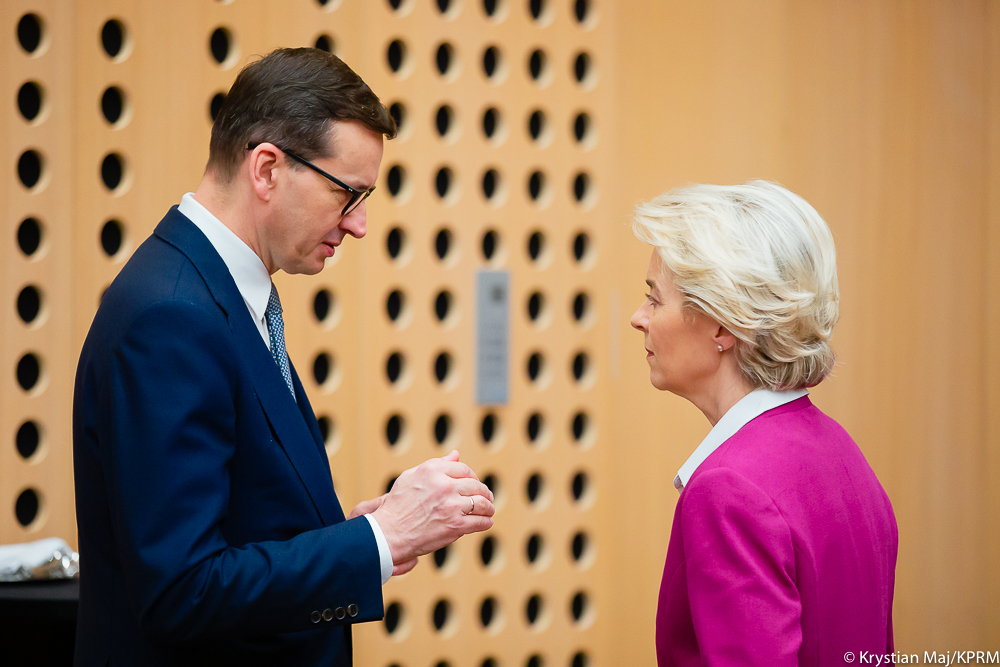The European Commission has recommended that Poland reduce its budget deficit by withdrawing measures introduced to protect consumers and companies from the rise in energy prices.
In a set of policy recommendations, the EU’s executive also called for Poland to limit future spending growth, fulfil the milestones agreed with Brussels to unlock frozen funds, increase investment in energy transition, improve the efficiency of social spending by targeting the poorest households, and raise the retirement age.
Komisja Europejska rekomenduje Polsce redukcję deficytu przez wycofanie wsparcia związanego z energią, a także ograniczenie wzrostu wydatków. Komisja zaleca także pilne wypełnienie kamieni milowych w zakresie Krajowego Planu Odbudowy. https://t.co/iPVcoDbNE0
— Business Insider Polska 🇵🇱 (@BIPolska) May 24, 2023
While the commission recommended all member countries end current energy-related support instruments by the end of 2023, it told Poland specifically to use the associated savings to reduce the deficit, which reached 3.7% of GDP in 2022, exceeding the EU’s limit of 3%.
That figure is set to reach 5% this year, forecasts the commission. In its recommendations, it warned Poland that if the deficit remains above 3% in 2023 it could open excessive deficit procedures, which can culminate in sanctions.
Measures implemented by the Polish government in 2022 included reduced VAT and excise duties on energy and fuels, cash subsidies for home heating, a cap on electricity prices for households, and gas cost subsidies to companies.
The commission estimates the net budgetary cost of such measures at 1.9% of GDP in 2022, noting that the general government balance has also been impacted by the cost of temporary protection of Ukrainian refugees. The impact of this help was estimated at 0.5% of GDP.
Poland’s deficit for 2022 came in almost 60% lower than planned in the budget, despite the effects of the pandemic and war in neighbouring Ukraine.
"We have survived the plagues of Egypt," says the prime minister https://t.co/CJl6Zlbwsn
— Notes from Poland 🇵🇱 (@notesfrompoland) March 6, 2023
“Should renewed energy price increases necessitate support measures, ensure that these are targeted at protecting vulnerable households and firms, fiscally affordable, and preserve incentives for energy savings,” advised the EU’s executive.
The commission also urged Poland to more broadly “improve the efficiency of public spending, including through better targeting of social benefits.”.
It noted that social benefits in Poland remain largely untargeted, meaning that much of the spending goes to high-income households, with the richest 20% of Poles receiving the same share of cash transfers as the poorest 20%.
Most of the largest social programmes in Poland – such as the government’s flagship child benefit policy and additional pension payments – are granted regardless of their income level.
Poland devotes proportionally less to social support than the EU average and its spending “is not always properly targeted”, says the @EU_Commission.
But the proportion of people at risk of poverty has been declining and is among the EU's lowest, it adds https://t.co/9qzaq1lMBV
— Notes from Poland 🇵🇱 (@notesfrompoland) May 26, 2022
The Polish ruling party, which is standing for an unprecedented third term in office this autumn, has already proposed to increase social spending by raising the size of child benefits and providing free medicine to children and the elderly. The main opposition party wants to double the tax-free income threshold.
The commission also advises Poland to “ensure the sustainability of the pension system by taking measures to increase the effective retirement age and reforming preferential pension schemes”. The current government lowered the retirement age when it came to power, reversing the previous government’s reforms.
In its recommendations, Brussels also calls on Poland to meet the various milestones agreed in order for Warsaw to unlock billions of euros in post-pandemic recovery funds.
Among those is an agreement to roll back elements of the discilpinary system for judges. Although the government has taken steps towards this, key legislation has been held up by a dispute within the constitutional court that is delaying its assessment of the measures.
The PM has appealed to a group of rebel constitutional court judges to “think about the good of Poland” and end their refusal to rule on a law intended to unlock billions of euros of EU funds.
The rebels do not accept the legitimacy of the chief justice https://t.co/tklteAq0HI
— Notes from Poland 🇵🇱 (@notesfrompoland) April 28, 2023
Main image credit: Krystian Maj/KPRM (under CC BY-NC-ND 2.0)

Alicja Ptak is deputy editor-in-chief of Notes from Poland and a multimedia journalist. She has written for Clean Energy Wire and The Times, and she hosts her own podcast, The Warsaw Wire, on Poland’s economy and energy sector. She previously worked for Reuters.



















